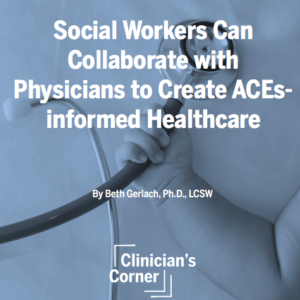Social Workers Can Collaborate with Physicians to Create ACEs-informed Healthcare
Want to discuss this article more on Facebook Live? Vote for it above! 
Join us for the upcoming Facebook Live Session with the author of this article!
Important to Know:
- We need to shift the focus from child to parent/caregiver to interrupt intergenerational transmission of trauma.
- Pediatricians should consider universally screening for ACEs.
- Social Workers can support physicians through their expertise in treating trauma, including brief interventions, motivational interviewing, addressing shame, and in building resilience.
Research on Adverse Childhood Experiences (ACEs) has provided strong evidence for the negative effects of trauma on the developing brain and health across the lifespan. Advances in biology, psychology and human development have shown that reducing the exposure to trauma in prenatal and early childhood is crucial for protecting children from the long-term harm of adverse experiences. Thus, early interventions that limit exposure to adversity and build safe, stable and nurturing environments can have a substantial effect on children’s long-term well-being. In fact, preventing and interrupting the exposure to trauma in childhood may well be one of the most important public health initiatives of our time.
With this in mind, one area of increasing attention is universal screening for adverse childhood experiences by healthcare providers serving expectant parents, children, and families. Physicians, nurses, social workers and other medical providers in obstetric, pediatric and family practices could be used as a front line in intervening in changing the long-term health trajectories of vulnerable children. This involves an important shift in focus from the child to the parent /caregiver to help them protect children from exposure to chronic adversity and build resilience. Understanding the caregiver’s own trauma history is also crucial, to interrupt the intergenerational transmission of trauma. Supporting parents that experienced trauma as children can help them make the connection between their childhood experiences and current behavior, develop compassion for themselves and choose a more protected path for their own children. Also, including a parallel conversation about family strengths and resilience can help parents/caregivers heal and protect their children from further adversity.
The American Academy of Pediatrics (AAP) has strongly encouraged physicians to screen for ACEs as part of their routine practice. The AAP is developing recommendations and strategies for best practices in addressing childhood trauma as part of a “medical home” model, including a whole child perspective and universal screening. However, there is some hesitation and doctors often express concerns about opening up a conversation with a patient that they can only be with for a short time frame, broaching subjects that they are not comfortable with and lacking appropriate support and resources for a patient who needs additional help. While these concerns are understandable, physicians can work with community partners to develop resources and referral networks. And, growing evidence from clinics implementing universal screening for trauma, show an increase in trusting relationships with families without a substantial increase in time for patient visits.
Clinicians have long been aware of the impact of childhood trauma and cumulative risk factors over time, while healthcare providers have been exploring toxic stress and social determinants of health. The ACEs research creates a shared language and naturally brings together both fields in an interdisciplinary approach to addressing childhood trauma and its long-term impacts. Social workers and other clinicians can provide support, training and technical assistance to physicians interested in implementing screening and intervention through their expertise in treating trauma, including brief interventions, motivational interviewing, addressing shame, and in building resilience.
Additional Resources:
- “To prevent childhood trauma pediatricians screen children and their parents” https://acestoohigh.com/2014/07/29/to-prevent-childhood-trauma-pediatricians-screen-children-and-their-parentsand-sometimes-just-parents/].
- “How childhood trauma affects health across a lifetime” TED Talk by Dr. Nadine Burke Harris https://www.ted.com/talks/nadine_burke_harris_how_childhood_trauma_affects_health_across_a_lifetime
- Shonkoff, J. (2016). Capitalizing on advances in science to reduce the health consequences of early childhood adversity. JAMA Pediatrics, 170(10), 1003-1007.
- “Addressing Adverse Childhood Experiences and Other Types of Trauma in the Primary Care Setting” American Academy of Pediatrics https://www.aap.org/en-us/Documents/ttb_addressing_aces.pdf
More Articles in this Issue:
Adverse Childhood Experiences (ACE) Study: The evidence behind what we know
How to Create Trauma-informed Systems of Care within Organizations
How to Administer a Trauma Screening Using The ACEs Questionnaire
ACE’s in Foster Care: Rethinking trauma-informed care
